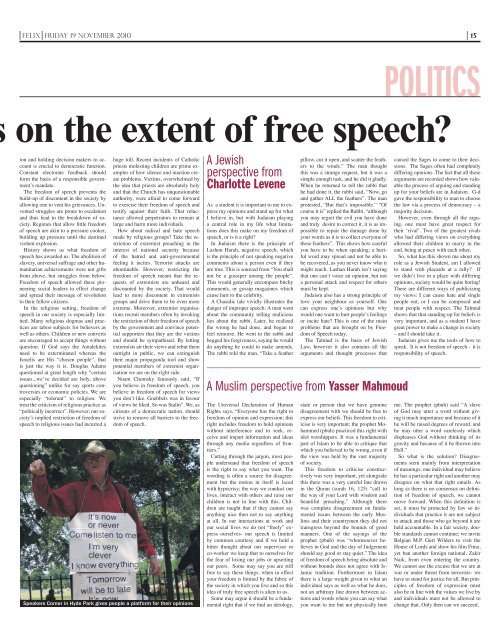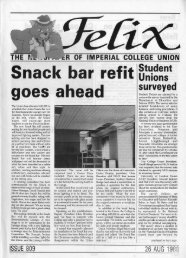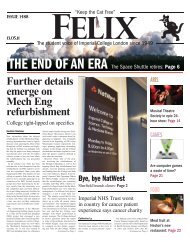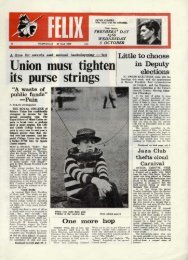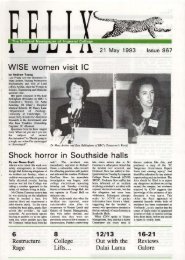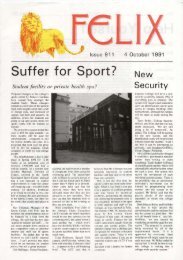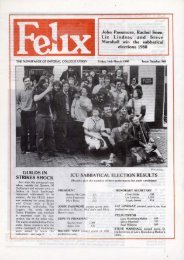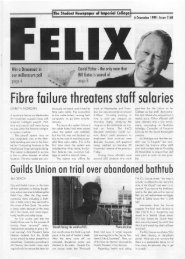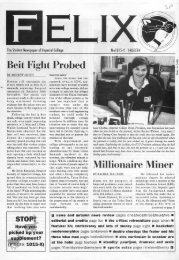1 - 9 News.indd - Felix
1 - 9 News.indd - Felix
1 - 9 News.indd - Felix
You also want an ePaper? Increase the reach of your titles
YUMPU automatically turns print PDFs into web optimized ePapers that Google loves.
FELIX Friday 19 November 2010<br />
15<br />
POLITICS<br />
on the extent of free speech?<br />
ion and holding decision makers to account<br />
is crucial to democratic function.<br />
Constant electorate feedback should<br />
form the basis of a responsible government’s<br />
mandate.<br />
The freedom of speech prevents the<br />
build-up of discontent in the society by<br />
allowing one to vent his grievances. Unvented<br />
struggles are prone to escalation<br />
and thus lead to the breakdown of society.<br />
Regimes that allow little freedom<br />
of speech are akin to a pressure cooker,<br />
building up pressure until the destined<br />
violent explosion.<br />
History shows us what freedom of<br />
speech has awarded us. The abolition of<br />
slavery, universal suffrage and other humanitarian<br />
achievements were not gifts<br />
from above, but struggles from below.<br />
Freedom of speech allowed these pioneering<br />
social leaders to effect change<br />
and spread their message of revolution<br />
to their fellow citizens.<br />
In the religious setting, freedom of<br />
speech in our society is especially limited.<br />
Many religious dogmas and practices<br />
are taboo subjects for believers as<br />
well as others. Children or new converts<br />
are encouraged to accept things without<br />
question. If God says the Amalekites<br />
need to be exterminated whereas the<br />
Israelis are His “chosen people”, that<br />
is just the way it is. Douglas Adams<br />
questioned at great length why “certain<br />
issues...we’ve decided are holy, above<br />
questioning” unlike for say sports controversies<br />
or economic policies. We are<br />
especially “tolerant” to religion. We<br />
treat the criticism of religious practice as<br />
“politically incorrect”. However, our society’s<br />
implied restriction of freedom of<br />
speech to religious issues had incurred a<br />
huge toll. Recent incidents of Catholic<br />
priests molesting children are prime examples<br />
of how silence and inaction create<br />
problems. Victims, overwhelmed by<br />
the idea that priests are absolutely holy<br />
and that the Church has unquestionable<br />
authority, were afraid to come forward<br />
to exercise their freedom of speech and<br />
testify against their faith. That reluctance<br />
allowed perpetrators to remain at<br />
large and harm more individuals.<br />
How about radical and hate speech<br />
made by religious groups? Take the restriction<br />
of extremist preaching in the<br />
interest of national security because<br />
of the hatred and anti-governmental<br />
feeling it incites. Terrorist attacks are<br />
abominable. However, restricting the<br />
freedom of speech meant that the requests<br />
of extremists are unheard and<br />
discounted by the society. That would<br />
lead to more discontent in extremists<br />
groups and drive them to be even more<br />
extreme. Moreover, extremist organisations<br />
recruit members often by invoking<br />
the restriction of their freedom of speech<br />
by the government and convince potential<br />
supporters that they are the victims<br />
and should be sympathised. By letting<br />
extremists air their views and rebut them<br />
outright in public, we can extinguish<br />
their major propaganda tool and show<br />
potential members of extremist organisation<br />
we are on the right side.<br />
Noam Chomsky famously said, “If<br />
you believe in freedom of speech, you<br />
believe in freedom of speech for views<br />
you don’t like. Goebbels was in favour<br />
of views he liked. So was Stalin”. We, as<br />
citizens of a democratic nation, should<br />
strive to remove all barriers to the freedom<br />
of speech.<br />
Speakers Corner in Hyde Park gives people a platform for their opinions<br />
A Jewish<br />
perspective from<br />
Charlotte Levene<br />
As a student it is important to me to express<br />
my opinions and stand up for what<br />
I believe in, but with Judaism playing<br />
a central role in my life what limitations<br />
does this make on my freedom of<br />
speech, or is it a right?<br />
In Judaism there is the principle of<br />
Lashon Harah, negative speech, which<br />
is the principle of not speaking negative<br />
comments about a person even if they<br />
are true. This is sourced from “You shall<br />
not be a gossiper among the people”.<br />
This would generally encompass bitchy<br />
comments, or gossip magazines which<br />
cause hurt to the celebrity.<br />
A Chasidic tale vividly illustrates the<br />
danger of improper speech: A man went<br />
about the community telling malicious<br />
lies about the rabbi. Later, he realized<br />
the wrong he had done, and began to<br />
feel remorse. He went to the rabbi and<br />
begged his forgiveness, saying he would<br />
do anything he could to make amends.<br />
The rabbi told the man, “Take a feather<br />
A Muslim perspective from Yasser Mahmoud<br />
The Universal Declaration of Human<br />
Rights says, “Everyone has the right to<br />
freedom of opinion and expression; this<br />
right includes freedom to hold opinions<br />
without interference and to seek, receive<br />
and impart information and ideas<br />
through any media regardless of frontiers.”<br />
Cutting through the jargon, most people<br />
understand that freedom of speech<br />
is the right to say what you want. The<br />
wording is often a source for disagreement<br />
but the notion in itself is laced<br />
with hypocrisy; the way we conduct our<br />
lives, interact with others and raise our<br />
children is not in line with this. Children<br />
are taught that if they cannot say<br />
anything nice then not to say anything<br />
at all. In our interactions at work and<br />
our social lives we do not “freely” express<br />
ourselves- our speech is limited<br />
by common courtesy and if we hold a<br />
bitter thought about our supervisor or<br />
co-worker we keep that to ourselves for<br />
the fear of losing our jobs or upsetting<br />
our peers. Some may say you are still<br />
free to say these things, when in effect<br />
your freedom is limited by the fabric of<br />
the society in which you live and so this<br />
idea of truly free speech is alien to us.<br />
Some may argue it should be a fundamental<br />
right that if we fi nd an ideology,<br />
pillow, cut it open, and scatter the feathers<br />
to the winds.” The man thought<br />
this was a strange request, but it was a<br />
simple enough task, and he did it gladly.<br />
When he returned to tell the rabbi that<br />
he had done it, the rabbi said, “Now, go<br />
and gather ALL the feathers”. The man<br />
protested, “But that’s impossible.” “Of<br />
course it is” replied the Rabbi, “although<br />
you may regret the evil you have done<br />
and truly desire to correct it, it is as impossible<br />
to repair the damage done by<br />
your words as it is to collect everyone of<br />
these feathers”. This shows how careful<br />
you have to be when speaking; a hurtful<br />
word may spread and not be able to<br />
be recovered, as you never know who it<br />
might reach. Lashan Harah isn’t saying<br />
that one can’t voice an opinion, but not<br />
a personal attack and respect for others<br />
must be kept.<br />
Judaism also has a strong principle of<br />
love your neighbour as yourself. One<br />
can express one’s opinions but why<br />
would one want to hurt people’s feelings<br />
or incite hate? This is one of the main<br />
problems that are brought on by Freedom<br />
of Speech today.<br />
The Talmud is the basis of Jewish<br />
Law, however it also contains all the<br />
arguments and thought processes that<br />
state or person that we have genuine<br />
disagreement with we should be free to<br />
express our beliefs. This freedom to criticise<br />
is very important; the prophet Mohammed<br />
(pbuh) practiced this right with<br />
idol worshippers. It was a fundamental<br />
part of Islam to be able to critique that<br />
which you believed to be wrong, even if<br />
the view was held by the vast majority<br />
of society.<br />
This freedom to criticise constructively<br />
was very important, yet alongside<br />
this there was a very careful line drawn<br />
in the Quran (surah 16, 125) “call to<br />
the way of your Lord with wisdom and<br />
beautiful preaching.” Although there<br />
was complete disagreement on fundamental<br />
issues between the early Muslims<br />
and their countrymen they did not<br />
transgress beyond the bounds of good<br />
manners. One of the sayings of the<br />
prophet (pbuh) was “whomsoever believes<br />
in God and the day of Judgement<br />
should say good or stay quiet.” The idea<br />
of freedom of speech being absolute and<br />
without bounds does not agree with Islamic<br />
tradition. Furthermore in Islam<br />
there is a large weight given to what an<br />
individual says as well as what he does,<br />
not an arbitrary line drawn between actions<br />
and words where you can say what<br />
you want to me but not physically hurt<br />
caused the Sages to come to their decisions.<br />
The Sages often had completely<br />
differing opinions. The fact that all these<br />
arguments are recorded shows how valuable<br />
the process of arguing and standing<br />
up for your beliefs are in Judaism. G-d<br />
gave the responsibility to man to choose<br />
the law via a process of democracy – a<br />
majority decision.<br />
However, even through all the arguing,<br />
one must have great respect for<br />
their ‘rival’. Two of the greatest rivals<br />
who had differing views on everything<br />
allowed their children to marry in the<br />
end, being at peace with each other.<br />
So, what has this shown me about my<br />
role as a Jewish Student, am I allowed<br />
to stand with placards at a rally? If<br />
we didn’t live in a place with differing<br />
opinions, society would be quite boring!<br />
There are different ways of publicizing<br />
my views: I can cause hate and single<br />
people out, or I can be composed and<br />
treat people with respect. The Talmud<br />
shows that that standing up for beliefs is<br />
very important, and as a student I have<br />
great power to make a change in society<br />
– and I should take it.<br />
Judaism gives me the tools of how to<br />
speak. It is not freedom of speech - it is<br />
responsibility of speech.<br />
me. The prophet (pbuh) said “A slave<br />
of God may utter a word without giving<br />
it much importance and because of it<br />
he will be raised degrees of reward, and<br />
he may utter a word carelessly which<br />
displeases God without thinking of its<br />
gravity and because of it be thrown into<br />
Hell.”<br />
So what is the solution? Disagreements<br />
stem mainly from interpretation<br />
of meanings; one individual may believe<br />
he has a particular right and another may<br />
disagree on what that right entails. As<br />
long as there is no consensus on defi nition<br />
of freedom of speech, we cannot<br />
move forward. When this defi nition is<br />
set, it must be protected by law so individuals<br />
that practice it are not subject<br />
to attack and those who go beyond it are<br />
held accountable. In a fair society, double<br />
standards cannot continue; we invite<br />
Belgian M.P. Gurt Wilders to visit the<br />
House of Lords and show his fi lm Fitna,<br />
yet ban another foreign national, Zakir<br />
Naik, from even entering the country.<br />
We cannot use the excuse that we are at<br />
war or under threat from terrorists- we<br />
have to stand for justice for all. But principles<br />
of freedom of expression must<br />
also be in line with the values we live by<br />
and individuals must not be allowed to<br />
change that. Only then can we succeed.


